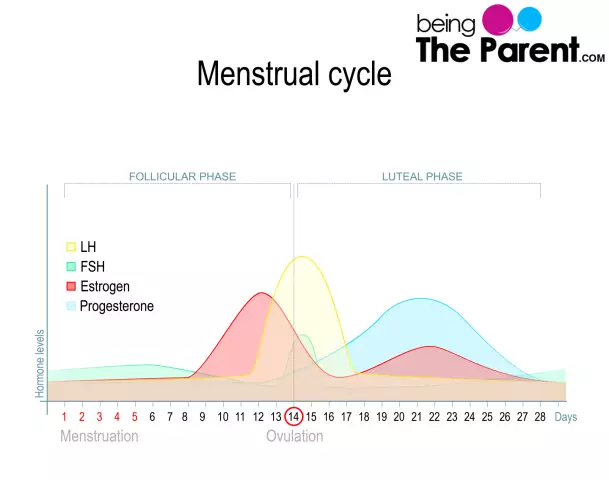- Author Curtis Blomfield blomfield@medicinehelpful.com.
- Public 2023-12-16 20:44.
- Last modified 2025-01-23 17:01.
Progesterone is a female sex hormone that is often confused with estrogen. In fact, both of these hormones are produced by the female body and are vital for it. The level of progesterone should always be within the established norm. Therefore, every woman needs to know how this hormone affects the state of he alth and what its indicators depend on.
Determination and production of progesterone
The hormone progesterone is found in the body not only in women, but also in men. In women, it is produced in the corpus luteum and in the adrenal gland, and in men, in the testes. Progesterone affects the menstrual cycle and helps maintain pregnancy. This happens due to the development of a special protein, which is responsible for preparing the uterus for the conception of a child. If there was no fertilization, the corpus luteum dies after about 14-15 days. Then the levels of the hormone progesterone decrease, and the endometrium begins to flake off.

Normaprogesterone in women
Normal progesterone levels are completely dependent on many factors. Hormone indicators are affected by: the phase of the menstrual cycle, the state of he alth, the onset of menopause, the use of oral contraceptives, bad habits, the woman's lifestyle, and the trimester of pregnancy. That is why the indicators established by physicians should be considered in each case separately. Measure the rate of progesterone in ng / ml, nmol / l, μg / l. For diagnosis, measurements in nmol / l are most often used. Quite rarely, laboratories use progesterone norm readings in ng / ml. Measurements in mcg/l are most often done abroad.
If a woman of childbearing age is not using oral contraception and is also not pregnant, her progesterone levels should be:
- During the follicular period - 0, 32-2, 23 nmol / l. At this stage of the cycle, the egg is just beginning to mature.
- During the period of ovulation - 0, 48-9, 41 nmol / l. If a couple is planning to conceive, this is the best option for fertilizing the egg.
- In the luteal phase - 6.99-56.63 nmol/l. The rate of progesterone on the 21st day of the cycle is significantly increased. At this time, the corpus luteum matures and dies, which leads to the onset of menstruation. Most doctors advise donating blood for hormones in this phase of the cycle.

Indicators of the norm of progesterone during pregnancy by week
It is not for nothing that many doctors consider progesterone the main hormone of pregnancy. It depends entirely on the amountthe process of bearing a child, as well as its intrauterine development. The rate of progesterone during pregnancy always depends on the trimester. The results determine the condition of the woman, as well as the development of the fetus. Doctors note that there is a certain norm of hormones:
- 1st trimester - 8.9-468.4 nmol/g;
- 2nd trimester - 71, 5-303, 1 nmol/g;
- 3rd trimester - 88.7-771.5 nmol/g.
For most women, it will be more convenient to distribute these indicators by week. Thus, you can accurately determine the required rate of progesterone in the blood and not worry about the condition of the child. From the fifth to the sixth week, this hormone is in the range of 18 nmol / l. During the seventh and eighth weeks, it increases to 33 nmol / l. By the onset of the ninth and tenth weeks of pregnancy, its indicators are already at least 38 nmol / l. Every week the hormone progesterone increases.
Static and average data cannot be taken seriously. Indicators of hormones can only be deciphered by doctors. That is why it is impossible to self-medicate by determining the reduced or increased rate of progesterone in the blood. This can only harm yourself and the child.

The value of progesterone for pregnant women
This hormone is very important for those women who only dream of a child. However, for expectant mothers, it is extremely necessary. Progesterone helps to bear a he althy baby, and also protects a woman from possible birth and postpartum complications. Among the vital functions of this hormone isnote the following:
- Progesterone helps the uterus grow while lowering its tone. This greatly reduces the risk of miscarriage.
- Helps to accumulate subcutaneous fat. When carrying a child, a woman needs nutrients that affect the development of the fetus. A sufficient amount of subcutaneous fat ensures the he alth of both of them.
- Suppresses the immune system. During pregnancy, a woman's immunity should be slightly weakened. Since the fetus has a genetic structure and from the father, this helps to reduce the percentage of rejection by the female body.
- Prepare muscles for childbirth.
- Increases the growth of the mammary glands, helps them prepare for a complete and natural method of feeding the baby.
- Participates in the development of the embryo.
The norm of progesterone during pregnancy should be within the established limits, so you should not miss routine tests and trips to the gynecologist.

Causes of high progesterone
Progesterone can be elevated both due to physiological causes and due to various diseases. The natural factors include the following:
- Pregnancy. The ovaries already increase the production of this hormone, and during the gestation of the fetus, the placenta also joins them. This substance also rapidly produces progesterone.
- Oral contraceptives. This method of protection against unwanted conception of a child also increases the numberprogesterone.
- The ovulatory phase of the menstrual cycle. An increase in hormone levels during this period indicates the readiness of the body for a future pregnancy.
Elevated progesterone can also be caused by a serious illness. Some of these include the following:
- Oncology. These could be tumors in the reproductive system.
- Benign growths, such as an ovarian cyst.
- Failure of the menstrual cycle, amenorrhea, uterine bleeding.
- Kidney disease.
The condition of a woman always depends on the norm of progesterone. The body will signal problems in every possible way with bad mood, fatigue, chronic stress, insomnia, etc. Therefore, it is very important to monitor any changes and immediately consult a doctor if suspicions arise.
Symptoms of high progesterone
If the levels of the hormone exceed the norm, this may be manifested by the following symptoms:
- Loss of interest in favorite activities and hobbies. Stops liking the usual life, a good mood is abruptly replaced by complete apathy.
- Libido is greatly increased. But at the same time, the woman begins to feel extremely insecure. Closeness and complexes appear.
- Sweating increases and skin quality begins to deteriorate from acne.
- Hair starts to get dirty faster, take on an untidy look.
- The normal functioning of the intestines is disrupted. Concerned about constipation.
- Suddenly gaining weight without much change in habitssupply.

The manifestation of increased progesterone
The established norm of progesterone varies by week. At the beginning of the menstrual cycle, the levels of this hormone are the lowest. Therefore, there should be no symptoms and violations of the usual state. The level of progesterone increases in the luteal phase of the cycle. However, there should not be any major changes in a woman's body even during this period.
The most common unwanted symptoms that determine elevated progesterone levels include frequent chest pains, which do not depend on the period of the menstrual cycle. Sometimes the timbre of the voice changes. Most symptoms depend on the woman's age and her physical and mental he alth.

Symptoms of low progesterone
If the hormone levels have dropped significantly, this may affect the state of the body with various symptoms:
- Bleeding may occur between periods.
- Begins to worry about puffiness, especially on the legs and face. Increases the size of the abdomen and waist.
- Sometimes the temperature may rise for no specific reason.
- Decreased libido.
- During intercourse, dryness begins to bother due to insufficient lubrication.
- Sleep is disturbed, chronic fatigue and depression develop.
- Always thirsty, thirsty.
- Levelblood sugar begins to rise. Without proper treatment, with low progesterone, the chances of developing diabetes increase.
Progesterone levels may decrease after a pregnancy is terminated in the early stages of fetal development. At least 2 times a year, a he althy woman who is not bearing a child should do tests, including hormone tests.

How to get tested for progesterone
The level of progesterone is determined by the method of taking blood from a vein. Most often, the rate of progesterone is determined on the 21st day of the cycle. However, this is done only with a menstrual cycle of 28 days. For reliable indicators, this must be done in the morning and on an empty stomach. The main role in determining the level of the hormone progesterone is played by the day of the menstrual cycle:
- If it lasts 28 days, you need to take a progesterone intake on the 21st day of the cycle.
- With a cycle of 21 days - on the 19th day from the first day of the previous period.
- Cycle of 35 days or more - on day 27.
If menstruation is unstable, you need to donate blood for the hormone progesterone twice a month. In this case, only a gynecologist can appoint an exact date. The same applies to donating blood during pregnancy.
When should I take a progesterone test
Give a referral for blood donation after the following examinations:
- If you suspect ovarian neoplasms.
- To find out the reason for the rejection of the fetus by the body or infertility.
- If there is bleeding, do notassociated with the menstrual cycle.
- With no or irregular periods.
- To confirm folliculometry if there is no ovulation.
You can get a referral for progesterone analysis even after a regular examination by a therapist. The reasons for the violation of the norm of progesterone in women may be changes in appearance that are noticeable without any additional research: a sharp weight gain, excessive sweating, a tired and unkempt appearance, apathy, and vice versa, increased excitability.
Why you need to monitor your progesterone levels
According to statistics, more than half of the female population suffers from an increase or decrease in the hormone progesterone. For a woman of childbearing age, this factor is considered extremely alarming. Due to the low rate of progesterone, menstrual pain, bleeding between cycles, and the risk of developing chronic inflammation can be disturbing. After identifying a hormone deficiency, the doctor prescribes a treatment regimen that is aimed at normalizing it. You cannot prescribe treatment for yourself, only a doctor will be able to correctly determine the cause of a decrease in the progesterone rate and prevent all possible negative consequences of its deficiency.

What threatens low progesterone
Decrease in the hormone can seriously affect the condition of a woman carrying a child. The condition of the fetus largely depends on the rate of progesterone during pregnancy. By weeks of gestation, you can calculate the requiredthe amount of this hormone in the blood. The longer the gestation period, the more its deficiency will affect the embryo. After 20 weeks, a woman begins to especially need his high rates. If the doctor detects a deviation from the norm, he prescribes a course of treatment, which consists of taking a certain group of drugs. The most popular of them are: Duphaston, Progesterone 1%, and Utrozhestan.
Every woman who carefully monitors her he alth should do tests for hormone levels from time to time. Especially if in the near future she is going to become a mother. Progesterone is a hormone that is responsible for successful conception and the course of further pregnancy. Therefore, it is very important to monitor its indicators and maintain the norm recommended by doctors.






